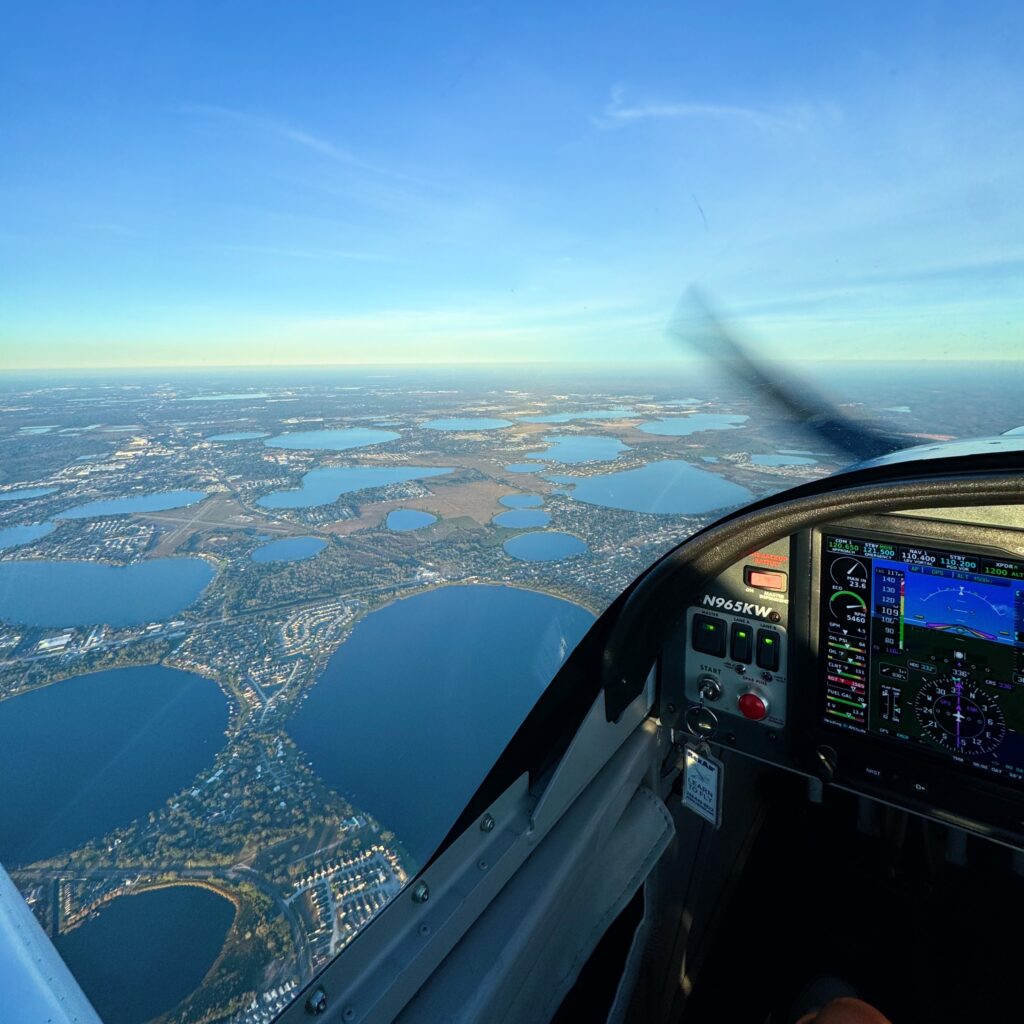Soaring Above Stress: Your Guide to Managing Stress in Flight Training

Dreaming of becoming a professional pilot is very exciting, but let’s be honest — flight training sounds pretty stressful. Even for current pilot students, stress and anxiety can sometimes inhibit their progress toward reaching their flight goals. You might be wondering: Is there any way to reduce this stress and make flight training more efficient and, just as importantly, more enjoyable?
The good news is that there is! Here’s your guide to navigating the pressures of flight training, making it not just less stressful and anxiety-inducing, but also more fun!
Stress and Its Causes
Let’s first define stress. At its core, it’s your body’s normal biological reaction to a potentially challenging and even dangerous situation. In these moments, your brain responds by flooding the body with chemicals and hormones such as adrenaline, leading to the rapid beating of the heart and heightened senses. The result? You feel more energized and more focused on the situation before you.
It is important to note that the surge of energy and focus that stress brings isn’t always a bad thing. In fact, a healthy dose of stress can be helpful in certain circumstances. If you think back to our ancestors, they have avoided predators and other assorted dangers for millions of years due to that jolt of adrenaline. Even now, moments of stress can help us perform at a higher level when navigating traffic on a busy freeway or taking a final exam.
Stress in relation to performance can be visualized as a curve or an inverted U. Too little stress can leave us unmotivated and disinterested, hindering peak performance. As stress levels rise, so does your performance—but only up to a point. Too much stress can cause anxiety, causing our level of performance to plummet. Therefore, our goal is not to eliminate stress from our lives entirely but to maintain a healthy level to maximize our flight training.
The Different Types of Stress
The triggers of stress vary from person to person, as we all have unique personalities. However, we can categorize stress into different types, and it’s important to note that not all of them are healthy.
- Acute Stress
This is the body’s immediate reaction to a challenging situation, and it happens to everyone. It can occur in both unpleasant situations (like rushing for an important meeting) and positive ones (like the thrill of downhill skiing). In flight training, this type of stress is expected, as learning to fly is a new and challenging endeavor for every student. Fortunately, acute stress can sharpen focus, which is useful for passing pilot exams. It also helps our bodies learn and adapt over time. Initially, stressful tasks become less so with experience. For example, a pilot’s first solo flight is likely to be more stressful than their hundredth.
- Chronic Stress
Unlike acute stress, chronic stress does not pass quickly. It is often the product of ongoing stressful events. Chronic stress can also worsen if these challenges accumulate. Job dissatisfaction or relationship problems are common situations that can lead to chronic stress.
- Anxiety
When stress becomes chronic, it becomes unhealthy, potentially contributing to issues such as depression, a weakened immune system, or anxiety. Anxiety, much like chronic stress, should be avoided, as it occurs when you experience high levels of worry or fear.
Taking Control of Your Stress in Flight Training
As we’ve learned, stress is a normal—and often beneficial—part of flight training. While it’s common to experience stress on your first few flights, learning a new maneuver, or preparing for a checkride, an excessive amount can cause low-level performance.
So, how can stress be managed? Fortunately, we can take control of our stress. Here are four strategies student pilots can use to reduce stress.
- Avoid
Stress can often be prevented by managing time, proper planning, and taking control of your environment. Combat pre-exam anxiety by studying early, not cramming. Say “no” to non-essential demands to reduce stress. For instance, if you know you have a checkride in three weeks, don’t agree to attend a conference the weekend before your big day.
- Alter
Evaluating the causes of stress can reduce it. Do you find yourself getting distracted by your roommates when you try to study? Try to find a quiet area to focus better. Communication is key; reach out to your flight instructor if there are aspects of flight training that you find stressful, and discuss solutions together.
- Accept
Some things will always be beyond our control, and certain stressors are necessary to accept. For example, you might not like taking tests, but they are a necessary part of becoming a pilot. The best approach is to accept things you can’t change with a positive attitude and focus on doing your best.
- Adapt
Lastly, cope with stress by changing your perspective. Instead of viewing a poor stage check resulting in a checkride delay as a failure, reframe it in your mind. Look at it as a learning opportunity that highlights an area for your improvement.
Make Your Next Flight Training Less Stressful
So, while stress is a natural part of the flight training journey, it doesn’t have to hold you back. By understanding its causes and actively employing strategies to avoid, alter, accept, and adapt, you can navigate the challenges with greater confidence and ease. Embrace these techniques, stay focused on your goals, and enjoy the incredible experience of learning to fly!

